Enhancing Motivation in Schools: Theories & Educator Strategies
VerifiedAdded on 2023/03/30
|8
|2428
|165
Essay
AI Summary
This essay delves into the crucial role of motivation within the educational environment, specifically focusing on strategies that educators can employ to foster a more engaging and productive learning atmosphere. It highlights the significance of both intrinsic and extrinsic motivation, emphasizing techniques to cultivate intrinsic motivation by connecting learning materials to students' personal interests and providing choices to enhance their sense of autonomy. The essay further explores several key motivational theories, including operant conditioning, expectancy-value theory, and Maslow's hierarchy of needs, detailing how each can be applied in the classroom to positively influence student behavior and academic performance. Additionally, it examines Piaget's theory of cognitive development, underscoring the importance of tailoring teaching methods to match students' cognitive stages. The essay concludes that by understanding and implementing these motivational theories, educators can significantly improve student engagement, academic outcomes, and overall classroom dynamics. Desklib offers a range of similar essays and resources for students seeking to deepen their understanding of educational psychology and teaching strategies.

Motivation
Paraphrase This Document
Need a fresh take? Get an instant paraphrase of this document with our AI Paraphraser
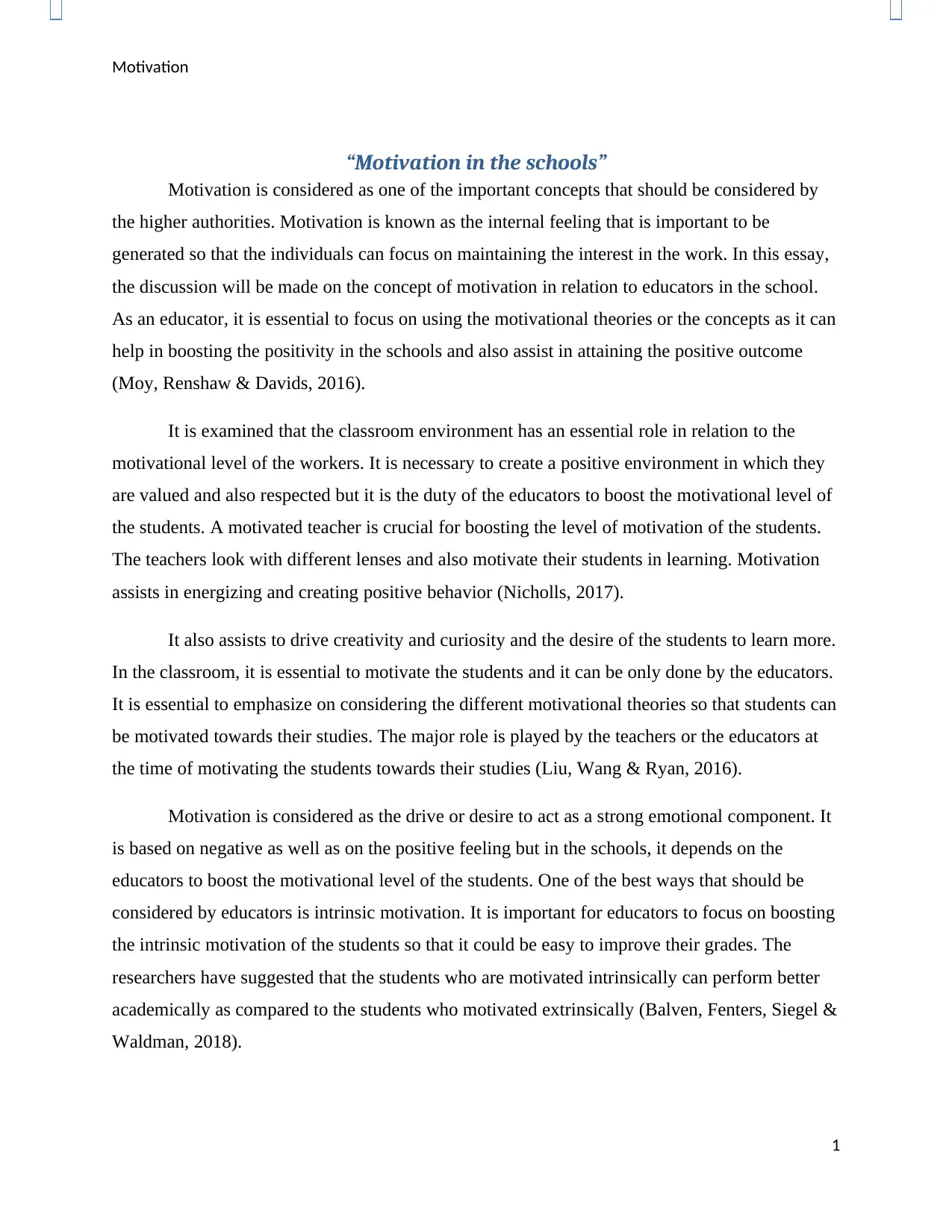
Motivation
“Motivation in the schools”
Motivation is considered as one of the important concepts that should be considered by
the higher authorities. Motivation is known as the internal feeling that is important to be
generated so that the individuals can focus on maintaining the interest in the work. In this essay,
the discussion will be made on the concept of motivation in relation to educators in the school.
As an educator, it is essential to focus on using the motivational theories or the concepts as it can
help in boosting the positivity in the schools and also assist in attaining the positive outcome
(Moy, Renshaw & Davids, 2016).
It is examined that the classroom environment has an essential role in relation to the
motivational level of the workers. It is necessary to create a positive environment in which they
are valued and also respected but it is the duty of the educators to boost the motivational level of
the students. A motivated teacher is crucial for boosting the level of motivation of the students.
The teachers look with different lenses and also motivate their students in learning. Motivation
assists in energizing and creating positive behavior (Nicholls, 2017).
It also assists to drive creativity and curiosity and the desire of the students to learn more.
In the classroom, it is essential to motivate the students and it can be only done by the educators.
It is essential to emphasize on considering the different motivational theories so that students can
be motivated towards their studies. The major role is played by the teachers or the educators at
the time of motivating the students towards their studies (Liu, Wang & Ryan, 2016).
Motivation is considered as the drive or desire to act as a strong emotional component. It
is based on negative as well as on the positive feeling but in the schools, it depends on the
educators to boost the motivational level of the students. One of the best ways that should be
considered by educators is intrinsic motivation. It is important for educators to focus on boosting
the intrinsic motivation of the students so that it could be easy to improve their grades. The
researchers have suggested that the students who are motivated intrinsically can perform better
academically as compared to the students who motivated extrinsically (Balven, Fenters, Siegel &
Waldman, 2018).
1
“Motivation in the schools”
Motivation is considered as one of the important concepts that should be considered by
the higher authorities. Motivation is known as the internal feeling that is important to be
generated so that the individuals can focus on maintaining the interest in the work. In this essay,
the discussion will be made on the concept of motivation in relation to educators in the school.
As an educator, it is essential to focus on using the motivational theories or the concepts as it can
help in boosting the positivity in the schools and also assist in attaining the positive outcome
(Moy, Renshaw & Davids, 2016).
It is examined that the classroom environment has an essential role in relation to the
motivational level of the workers. It is necessary to create a positive environment in which they
are valued and also respected but it is the duty of the educators to boost the motivational level of
the students. A motivated teacher is crucial for boosting the level of motivation of the students.
The teachers look with different lenses and also motivate their students in learning. Motivation
assists in energizing and creating positive behavior (Nicholls, 2017).
It also assists to drive creativity and curiosity and the desire of the students to learn more.
In the classroom, it is essential to motivate the students and it can be only done by the educators.
It is essential to emphasize on considering the different motivational theories so that students can
be motivated towards their studies. The major role is played by the teachers or the educators at
the time of motivating the students towards their studies (Liu, Wang & Ryan, 2016).
Motivation is considered as the drive or desire to act as a strong emotional component. It
is based on negative as well as on the positive feeling but in the schools, it depends on the
educators to boost the motivational level of the students. One of the best ways that should be
considered by educators is intrinsic motivation. It is important for educators to focus on boosting
the intrinsic motivation of the students so that it could be easy to improve their grades. The
researchers have suggested that the students who are motivated intrinsically can perform better
academically as compared to the students who motivated extrinsically (Balven, Fenters, Siegel &
Waldman, 2018).
1
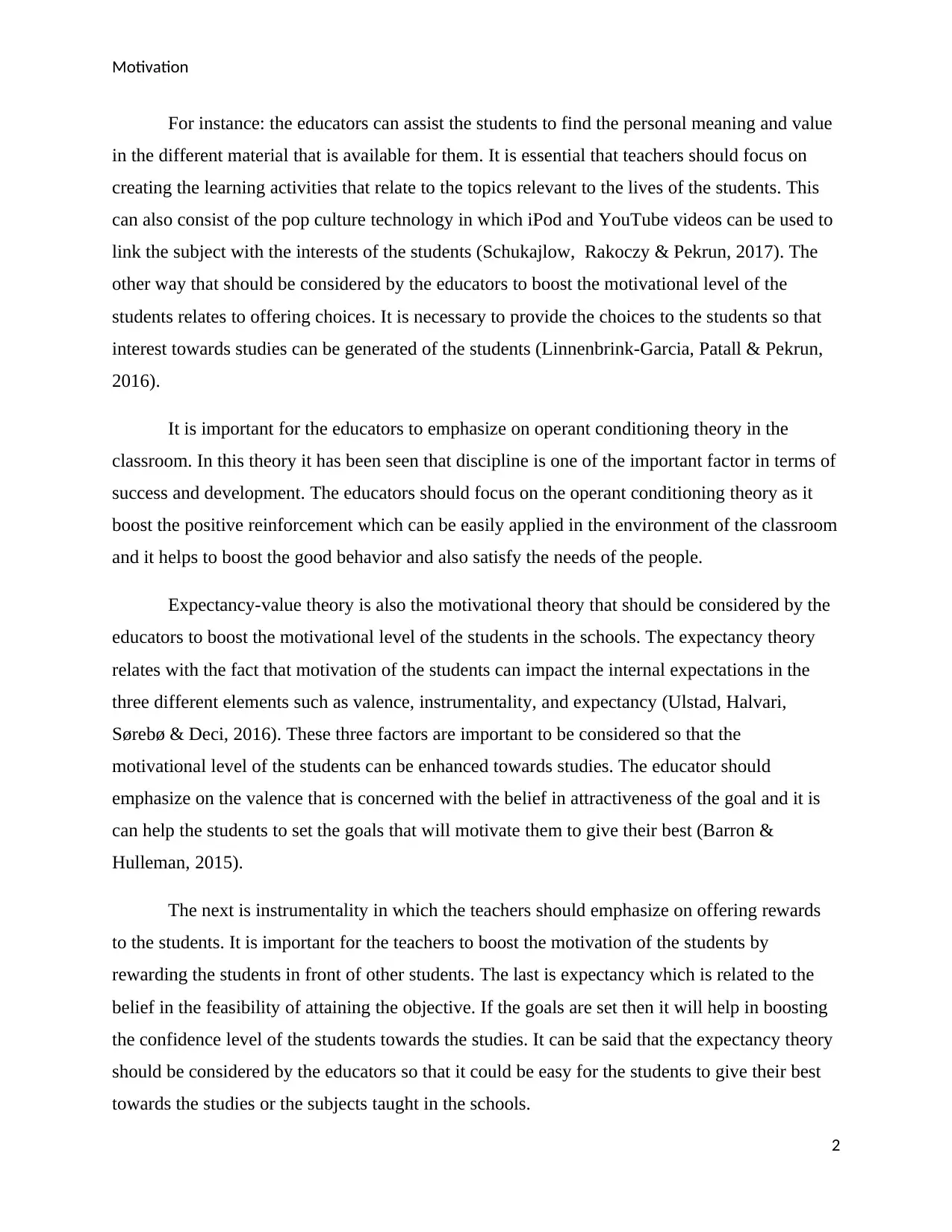
Motivation
For instance: the educators can assist the students to find the personal meaning and value
in the different material that is available for them. It is essential that teachers should focus on
creating the learning activities that relate to the topics relevant to the lives of the students. This
can also consist of the pop culture technology in which iPod and YouTube videos can be used to
link the subject with the interests of the students (Schukajlow, Rakoczy & Pekrun, 2017). The
other way that should be considered by the educators to boost the motivational level of the
students relates to offering choices. It is necessary to provide the choices to the students so that
interest towards studies can be generated of the students (Linnenbrink-Garcia, Patall & Pekrun,
2016).
It is important for the educators to emphasize on operant conditioning theory in the
classroom. In this theory it has been seen that discipline is one of the important factor in terms of
success and development. The educators should focus on the operant conditioning theory as it
boost the positive reinforcement which can be easily applied in the environment of the classroom
and it helps to boost the good behavior and also satisfy the needs of the people.
Expectancy-value theory is also the motivational theory that should be considered by the
educators to boost the motivational level of the students in the schools. The expectancy theory
relates with the fact that motivation of the students can impact the internal expectations in the
three different elements such as valence, instrumentality, and expectancy (Ulstad, Halvari,
Sørebø & Deci, 2016). These three factors are important to be considered so that the
motivational level of the students can be enhanced towards studies. The educator should
emphasize on the valence that is concerned with the belief in attractiveness of the goal and it is
can help the students to set the goals that will motivate them to give their best (Barron &
Hulleman, 2015).
The next is instrumentality in which the teachers should emphasize on offering rewards
to the students. It is important for the teachers to boost the motivation of the students by
rewarding the students in front of other students. The last is expectancy which is related to the
belief in the feasibility of attaining the objective. If the goals are set then it will help in boosting
the confidence level of the students towards the studies. It can be said that the expectancy theory
should be considered by the educators so that it could be easy for the students to give their best
towards the studies or the subjects taught in the schools.
2
For instance: the educators can assist the students to find the personal meaning and value
in the different material that is available for them. It is essential that teachers should focus on
creating the learning activities that relate to the topics relevant to the lives of the students. This
can also consist of the pop culture technology in which iPod and YouTube videos can be used to
link the subject with the interests of the students (Schukajlow, Rakoczy & Pekrun, 2017). The
other way that should be considered by the educators to boost the motivational level of the
students relates to offering choices. It is necessary to provide the choices to the students so that
interest towards studies can be generated of the students (Linnenbrink-Garcia, Patall & Pekrun,
2016).
It is important for the educators to emphasize on operant conditioning theory in the
classroom. In this theory it has been seen that discipline is one of the important factor in terms of
success and development. The educators should focus on the operant conditioning theory as it
boost the positive reinforcement which can be easily applied in the environment of the classroom
and it helps to boost the good behavior and also satisfy the needs of the people.
Expectancy-value theory is also the motivational theory that should be considered by the
educators to boost the motivational level of the students in the schools. The expectancy theory
relates with the fact that motivation of the students can impact the internal expectations in the
three different elements such as valence, instrumentality, and expectancy (Ulstad, Halvari,
Sørebø & Deci, 2016). These three factors are important to be considered so that the
motivational level of the students can be enhanced towards studies. The educator should
emphasize on the valence that is concerned with the belief in attractiveness of the goal and it is
can help the students to set the goals that will motivate them to give their best (Barron &
Hulleman, 2015).
The next is instrumentality in which the teachers should emphasize on offering rewards
to the students. It is important for the teachers to boost the motivation of the students by
rewarding the students in front of other students. The last is expectancy which is related to the
belief in the feasibility of attaining the objective. If the goals are set then it will help in boosting
the confidence level of the students towards the studies. It can be said that the expectancy theory
should be considered by the educators so that it could be easy for the students to give their best
towards the studies or the subjects taught in the schools.
2
⊘ This is a preview!⊘
Do you want full access?
Subscribe today to unlock all pages.

Trusted by 1+ million students worldwide
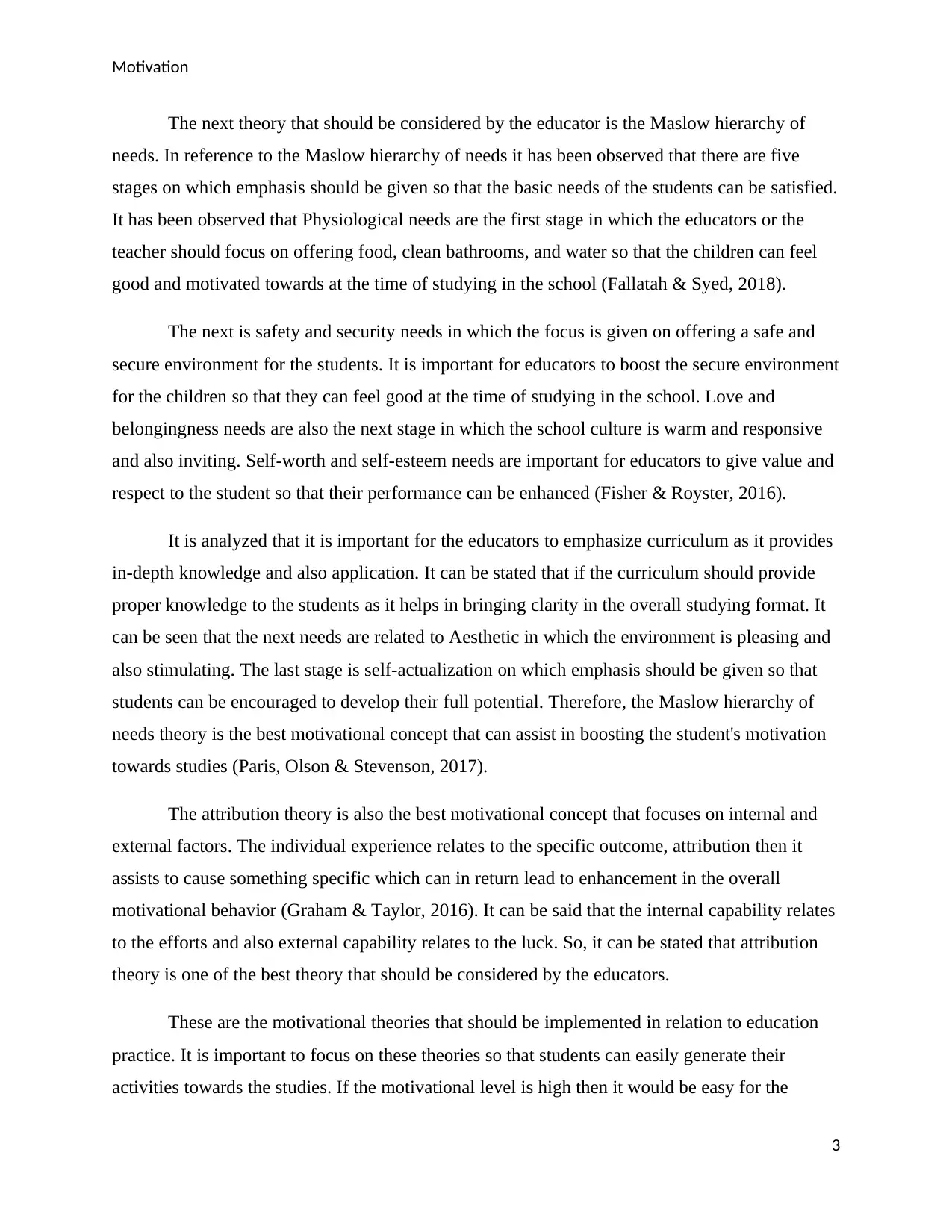
Motivation
The next theory that should be considered by the educator is the Maslow hierarchy of
needs. In reference to the Maslow hierarchy of needs it has been observed that there are five
stages on which emphasis should be given so that the basic needs of the students can be satisfied.
It has been observed that Physiological needs are the first stage in which the educators or the
teacher should focus on offering food, clean bathrooms, and water so that the children can feel
good and motivated towards at the time of studying in the school (Fallatah & Syed, 2018).
The next is safety and security needs in which the focus is given on offering a safe and
secure environment for the students. It is important for educators to boost the secure environment
for the children so that they can feel good at the time of studying in the school. Love and
belongingness needs are also the next stage in which the school culture is warm and responsive
and also inviting. Self-worth and self-esteem needs are important for educators to give value and
respect to the student so that their performance can be enhanced (Fisher & Royster, 2016).
It is analyzed that it is important for the educators to emphasize curriculum as it provides
in-depth knowledge and also application. It can be stated that if the curriculum should provide
proper knowledge to the students as it helps in bringing clarity in the overall studying format. It
can be seen that the next needs are related to Aesthetic in which the environment is pleasing and
also stimulating. The last stage is self-actualization on which emphasis should be given so that
students can be encouraged to develop their full potential. Therefore, the Maslow hierarchy of
needs theory is the best motivational concept that can assist in boosting the student's motivation
towards studies (Paris, Olson & Stevenson, 2017).
The attribution theory is also the best motivational concept that focuses on internal and
external factors. The individual experience relates to the specific outcome, attribution then it
assists to cause something specific which can in return lead to enhancement in the overall
motivational behavior (Graham & Taylor, 2016). It can be said that the internal capability relates
to the efforts and also external capability relates to the luck. So, it can be stated that attribution
theory is one of the best theory that should be considered by the educators.
These are the motivational theories that should be implemented in relation to education
practice. It is important to focus on these theories so that students can easily generate their
activities towards the studies. If the motivational level is high then it would be easy for the
3
The next theory that should be considered by the educator is the Maslow hierarchy of
needs. In reference to the Maslow hierarchy of needs it has been observed that there are five
stages on which emphasis should be given so that the basic needs of the students can be satisfied.
It has been observed that Physiological needs are the first stage in which the educators or the
teacher should focus on offering food, clean bathrooms, and water so that the children can feel
good and motivated towards at the time of studying in the school (Fallatah & Syed, 2018).
The next is safety and security needs in which the focus is given on offering a safe and
secure environment for the students. It is important for educators to boost the secure environment
for the children so that they can feel good at the time of studying in the school. Love and
belongingness needs are also the next stage in which the school culture is warm and responsive
and also inviting. Self-worth and self-esteem needs are important for educators to give value and
respect to the student so that their performance can be enhanced (Fisher & Royster, 2016).
It is analyzed that it is important for the educators to emphasize curriculum as it provides
in-depth knowledge and also application. It can be stated that if the curriculum should provide
proper knowledge to the students as it helps in bringing clarity in the overall studying format. It
can be seen that the next needs are related to Aesthetic in which the environment is pleasing and
also stimulating. The last stage is self-actualization on which emphasis should be given so that
students can be encouraged to develop their full potential. Therefore, the Maslow hierarchy of
needs theory is the best motivational concept that can assist in boosting the student's motivation
towards studies (Paris, Olson & Stevenson, 2017).
The attribution theory is also the best motivational concept that focuses on internal and
external factors. The individual experience relates to the specific outcome, attribution then it
assists to cause something specific which can in return lead to enhancement in the overall
motivational behavior (Graham & Taylor, 2016). It can be said that the internal capability relates
to the efforts and also external capability relates to the luck. So, it can be stated that attribution
theory is one of the best theory that should be considered by the educators.
These are the motivational theories that should be implemented in relation to education
practice. It is important to focus on these theories so that students can easily generate their
activities towards the studies. If the motivational level is high then it would be easy for the
3
Paraphrase This Document
Need a fresh take? Get an instant paraphrase of this document with our AI Paraphraser
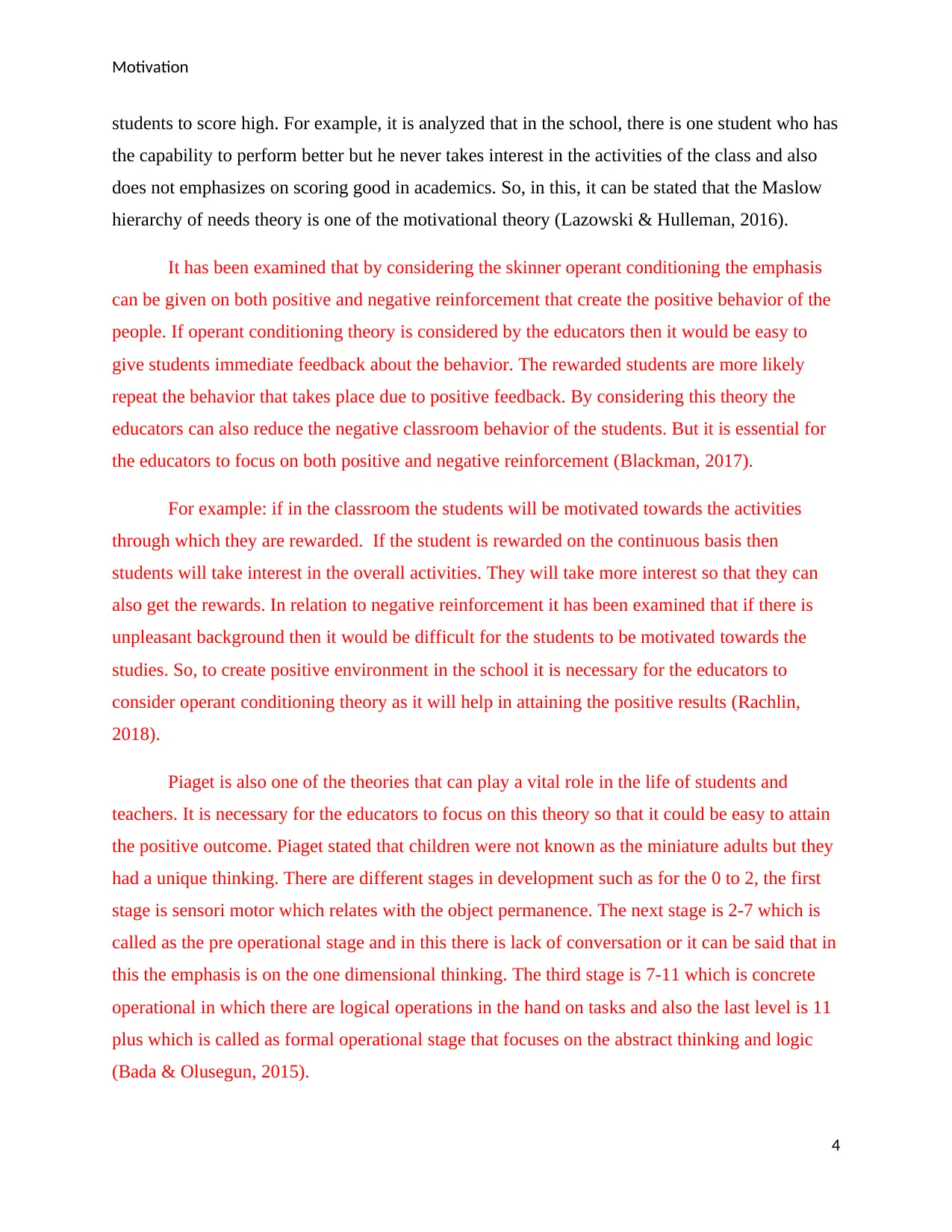
Motivation
students to score high. For example, it is analyzed that in the school, there is one student who has
the capability to perform better but he never takes interest in the activities of the class and also
does not emphasizes on scoring good in academics. So, in this, it can be stated that the Maslow
hierarchy of needs theory is one of the motivational theory (Lazowski & Hulleman, 2016).
It has been examined that by considering the skinner operant conditioning the emphasis
can be given on both positive and negative reinforcement that create the positive behavior of the
people. If operant conditioning theory is considered by the educators then it would be easy to
give students immediate feedback about the behavior. The rewarded students are more likely
repeat the behavior that takes place due to positive feedback. By considering this theory the
educators can also reduce the negative classroom behavior of the students. But it is essential for
the educators to focus on both positive and negative reinforcement (Blackman, 2017).
For example: if in the classroom the students will be motivated towards the activities
through which they are rewarded. If the student is rewarded on the continuous basis then
students will take interest in the overall activities. They will take more interest so that they can
also get the rewards. In relation to negative reinforcement it has been examined that if there is
unpleasant background then it would be difficult for the students to be motivated towards the
studies. So, to create positive environment in the school it is necessary for the educators to
consider operant conditioning theory as it will help in attaining the positive results (Rachlin,
2018).
Piaget is also one of the theories that can play a vital role in the life of students and
teachers. It is necessary for the educators to focus on this theory so that it could be easy to attain
the positive outcome. Piaget stated that children were not known as the miniature adults but they
had a unique thinking. There are different stages in development such as for the 0 to 2, the first
stage is sensori motor which relates with the object permanence. The next stage is 2-7 which is
called as the pre operational stage and in this there is lack of conversation or it can be said that in
this the emphasis is on the one dimensional thinking. The third stage is 7-11 which is concrete
operational in which there are logical operations in the hand on tasks and also the last level is 11
plus which is called as formal operational stage that focuses on the abstract thinking and logic
(Bada & Olusegun, 2015).
4
students to score high. For example, it is analyzed that in the school, there is one student who has
the capability to perform better but he never takes interest in the activities of the class and also
does not emphasizes on scoring good in academics. So, in this, it can be stated that the Maslow
hierarchy of needs theory is one of the motivational theory (Lazowski & Hulleman, 2016).
It has been examined that by considering the skinner operant conditioning the emphasis
can be given on both positive and negative reinforcement that create the positive behavior of the
people. If operant conditioning theory is considered by the educators then it would be easy to
give students immediate feedback about the behavior. The rewarded students are more likely
repeat the behavior that takes place due to positive feedback. By considering this theory the
educators can also reduce the negative classroom behavior of the students. But it is essential for
the educators to focus on both positive and negative reinforcement (Blackman, 2017).
For example: if in the classroom the students will be motivated towards the activities
through which they are rewarded. If the student is rewarded on the continuous basis then
students will take interest in the overall activities. They will take more interest so that they can
also get the rewards. In relation to negative reinforcement it has been examined that if there is
unpleasant background then it would be difficult for the students to be motivated towards the
studies. So, to create positive environment in the school it is necessary for the educators to
consider operant conditioning theory as it will help in attaining the positive results (Rachlin,
2018).
Piaget is also one of the theories that can play a vital role in the life of students and
teachers. It is necessary for the educators to focus on this theory so that it could be easy to attain
the positive outcome. Piaget stated that children were not known as the miniature adults but they
had a unique thinking. There are different stages in development such as for the 0 to 2, the first
stage is sensori motor which relates with the object permanence. The next stage is 2-7 which is
called as the pre operational stage and in this there is lack of conversation or it can be said that in
this the emphasis is on the one dimensional thinking. The third stage is 7-11 which is concrete
operational in which there are logical operations in the hand on tasks and also the last level is 11
plus which is called as formal operational stage that focuses on the abstract thinking and logic
(Bada & Olusegun, 2015).
4
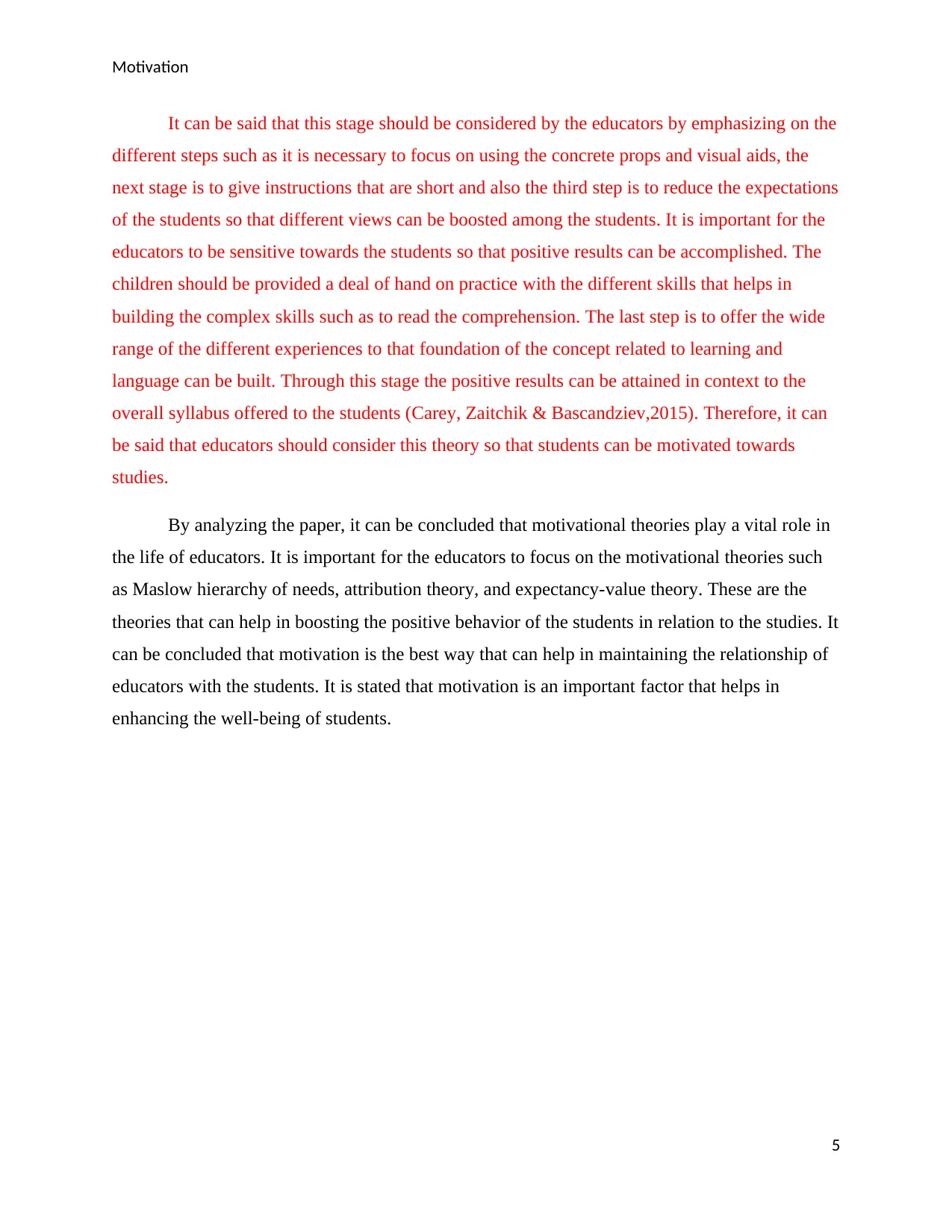
Motivation
It can be said that this stage should be considered by the educators by emphasizing on the
different steps such as it is necessary to focus on using the concrete props and visual aids, the
next stage is to give instructions that are short and also the third step is to reduce the expectations
of the students so that different views can be boosted among the students. It is important for the
educators to be sensitive towards the students so that positive results can be accomplished. The
children should be provided a deal of hand on practice with the different skills that helps in
building the complex skills such as to read the comprehension. The last step is to offer the wide
range of the different experiences to that foundation of the concept related to learning and
language can be built. Through this stage the positive results can be attained in context to the
overall syllabus offered to the students (Carey, Zaitchik & Bascandziev,2015). Therefore, it can
be said that educators should consider this theory so that students can be motivated towards
studies.
By analyzing the paper, it can be concluded that motivational theories play a vital role in
the life of educators. It is important for the educators to focus on the motivational theories such
as Maslow hierarchy of needs, attribution theory, and expectancy-value theory. These are the
theories that can help in boosting the positive behavior of the students in relation to the studies. It
can be concluded that motivation is the best way that can help in maintaining the relationship of
educators with the students. It is stated that motivation is an important factor that helps in
enhancing the well-being of students.
5
It can be said that this stage should be considered by the educators by emphasizing on the
different steps such as it is necessary to focus on using the concrete props and visual aids, the
next stage is to give instructions that are short and also the third step is to reduce the expectations
of the students so that different views can be boosted among the students. It is important for the
educators to be sensitive towards the students so that positive results can be accomplished. The
children should be provided a deal of hand on practice with the different skills that helps in
building the complex skills such as to read the comprehension. The last step is to offer the wide
range of the different experiences to that foundation of the concept related to learning and
language can be built. Through this stage the positive results can be attained in context to the
overall syllabus offered to the students (Carey, Zaitchik & Bascandziev,2015). Therefore, it can
be said that educators should consider this theory so that students can be motivated towards
studies.
By analyzing the paper, it can be concluded that motivational theories play a vital role in
the life of educators. It is important for the educators to focus on the motivational theories such
as Maslow hierarchy of needs, attribution theory, and expectancy-value theory. These are the
theories that can help in boosting the positive behavior of the students in relation to the studies. It
can be concluded that motivation is the best way that can help in maintaining the relationship of
educators with the students. It is stated that motivation is an important factor that helps in
enhancing the well-being of students.
5
⊘ This is a preview!⊘
Do you want full access?
Subscribe today to unlock all pages.

Trusted by 1+ million students worldwide
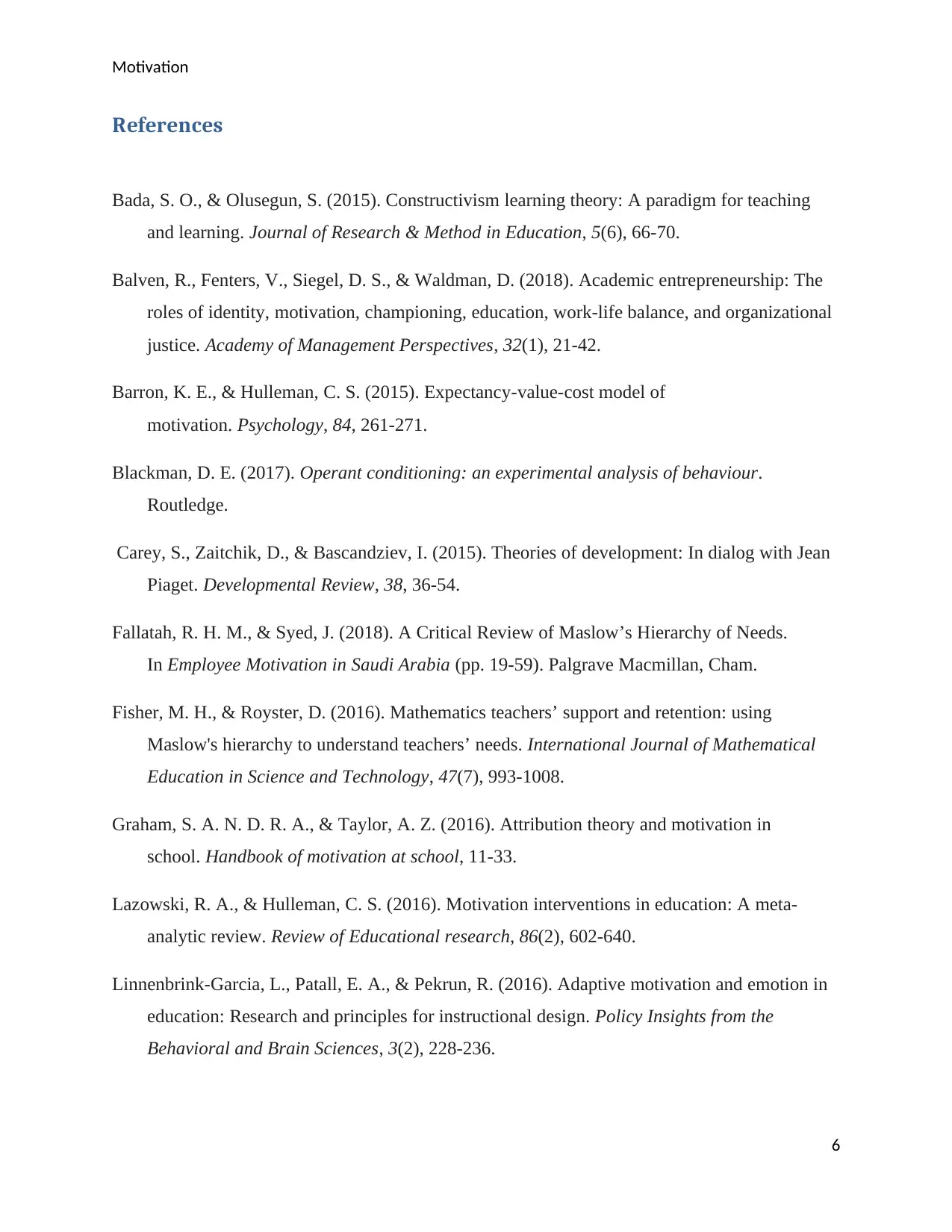
Motivation
References
Bada, S. O., & Olusegun, S. (2015). Constructivism learning theory: A paradigm for teaching
and learning. Journal of Research & Method in Education, 5(6), 66-70.
Balven, R., Fenters, V., Siegel, D. S., & Waldman, D. (2018). Academic entrepreneurship: The
roles of identity, motivation, championing, education, work-life balance, and organizational
justice. Academy of Management Perspectives, 32(1), 21-42.
Barron, K. E., & Hulleman, C. S. (2015). Expectancy-value-cost model of
motivation. Psychology, 84, 261-271.
Blackman, D. E. (2017). Operant conditioning: an experimental analysis of behaviour.
Routledge.
Carey, S., Zaitchik, D., & Bascandziev, I. (2015). Theories of development: In dialog with Jean
Piaget. Developmental Review, 38, 36-54.
Fallatah, R. H. M., & Syed, J. (2018). A Critical Review of Maslow’s Hierarchy of Needs.
In Employee Motivation in Saudi Arabia (pp. 19-59). Palgrave Macmillan, Cham.
Fisher, M. H., & Royster, D. (2016). Mathematics teachers’ support and retention: using
Maslow's hierarchy to understand teachers’ needs. International Journal of Mathematical
Education in Science and Technology, 47(7), 993-1008.
Graham, S. A. N. D. R. A., & Taylor, A. Z. (2016). Attribution theory and motivation in
school. Handbook of motivation at school, 11-33.
Lazowski, R. A., & Hulleman, C. S. (2016). Motivation interventions in education: A meta-
analytic review. Review of Educational research, 86(2), 602-640.
Linnenbrink-Garcia, L., Patall, E. A., & Pekrun, R. (2016). Adaptive motivation and emotion in
education: Research and principles for instructional design. Policy Insights from the
Behavioral and Brain Sciences, 3(2), 228-236.
6
References
Bada, S. O., & Olusegun, S. (2015). Constructivism learning theory: A paradigm for teaching
and learning. Journal of Research & Method in Education, 5(6), 66-70.
Balven, R., Fenters, V., Siegel, D. S., & Waldman, D. (2018). Academic entrepreneurship: The
roles of identity, motivation, championing, education, work-life balance, and organizational
justice. Academy of Management Perspectives, 32(1), 21-42.
Barron, K. E., & Hulleman, C. S. (2015). Expectancy-value-cost model of
motivation. Psychology, 84, 261-271.
Blackman, D. E. (2017). Operant conditioning: an experimental analysis of behaviour.
Routledge.
Carey, S., Zaitchik, D., & Bascandziev, I. (2015). Theories of development: In dialog with Jean
Piaget. Developmental Review, 38, 36-54.
Fallatah, R. H. M., & Syed, J. (2018). A Critical Review of Maslow’s Hierarchy of Needs.
In Employee Motivation in Saudi Arabia (pp. 19-59). Palgrave Macmillan, Cham.
Fisher, M. H., & Royster, D. (2016). Mathematics teachers’ support and retention: using
Maslow's hierarchy to understand teachers’ needs. International Journal of Mathematical
Education in Science and Technology, 47(7), 993-1008.
Graham, S. A. N. D. R. A., & Taylor, A. Z. (2016). Attribution theory and motivation in
school. Handbook of motivation at school, 11-33.
Lazowski, R. A., & Hulleman, C. S. (2016). Motivation interventions in education: A meta-
analytic review. Review of Educational research, 86(2), 602-640.
Linnenbrink-Garcia, L., Patall, E. A., & Pekrun, R. (2016). Adaptive motivation and emotion in
education: Research and principles for instructional design. Policy Insights from the
Behavioral and Brain Sciences, 3(2), 228-236.
6
Paraphrase This Document
Need a fresh take? Get an instant paraphrase of this document with our AI Paraphraser
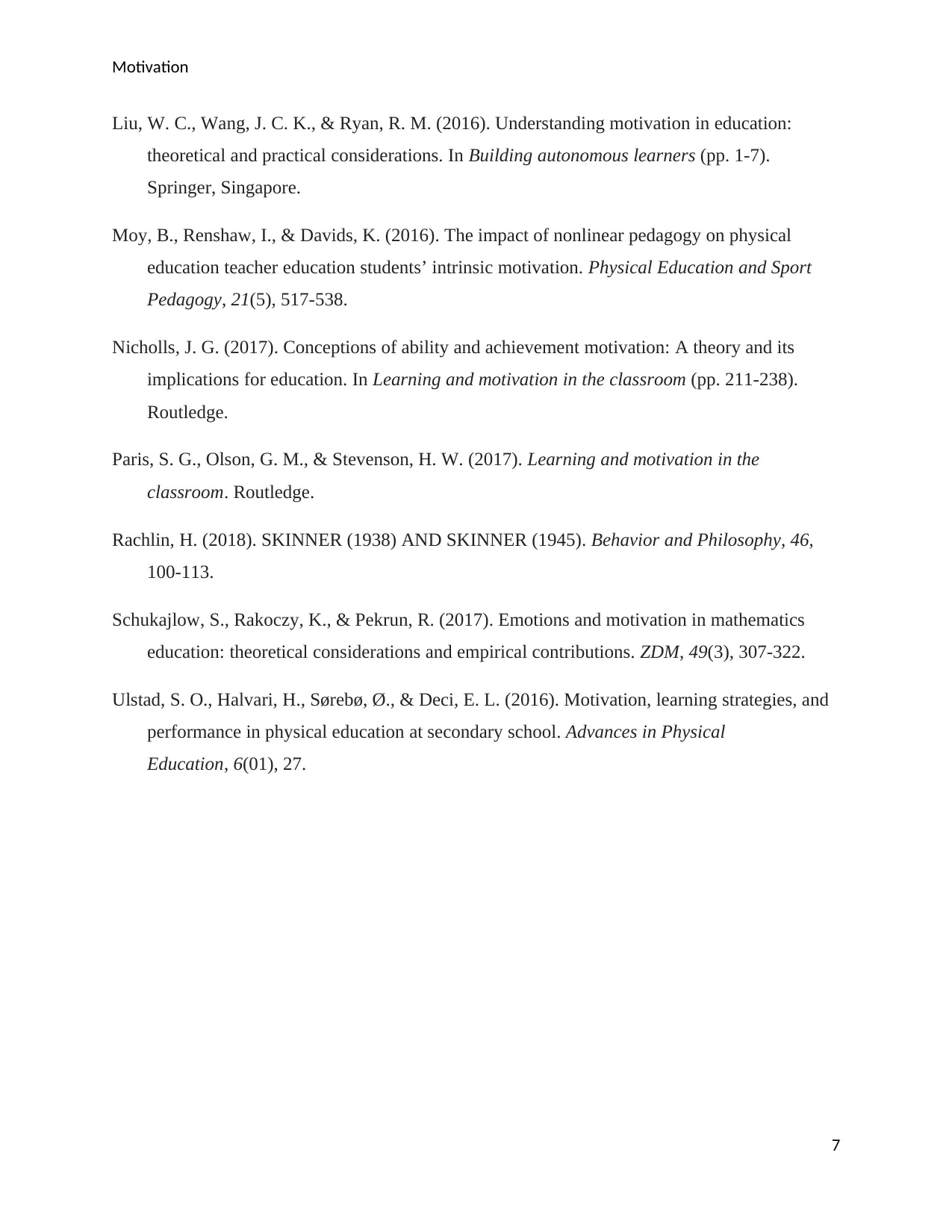
Motivation
Liu, W. C., Wang, J. C. K., & Ryan, R. M. (2016). Understanding motivation in education:
theoretical and practical considerations. In Building autonomous learners (pp. 1-7).
Springer, Singapore.
Moy, B., Renshaw, I., & Davids, K. (2016). The impact of nonlinear pedagogy on physical
education teacher education students’ intrinsic motivation. Physical Education and Sport
Pedagogy, 21(5), 517-538.
Nicholls, J. G. (2017). Conceptions of ability and achievement motivation: A theory and its
implications for education. In Learning and motivation in the classroom (pp. 211-238).
Routledge.
Paris, S. G., Olson, G. M., & Stevenson, H. W. (2017). Learning and motivation in the
classroom. Routledge.
Rachlin, H. (2018). SKINNER (1938) AND SKINNER (1945). Behavior and Philosophy, 46,
100-113.
Schukajlow, S., Rakoczy, K., & Pekrun, R. (2017). Emotions and motivation in mathematics
education: theoretical considerations and empirical contributions. ZDM, 49(3), 307-322.
Ulstad, S. O., Halvari, H., Sørebø, Ø., & Deci, E. L. (2016). Motivation, learning strategies, and
performance in physical education at secondary school. Advances in Physical
Education, 6(01), 27.
7
Liu, W. C., Wang, J. C. K., & Ryan, R. M. (2016). Understanding motivation in education:
theoretical and practical considerations. In Building autonomous learners (pp. 1-7).
Springer, Singapore.
Moy, B., Renshaw, I., & Davids, K. (2016). The impact of nonlinear pedagogy on physical
education teacher education students’ intrinsic motivation. Physical Education and Sport
Pedagogy, 21(5), 517-538.
Nicholls, J. G. (2017). Conceptions of ability and achievement motivation: A theory and its
implications for education. In Learning and motivation in the classroom (pp. 211-238).
Routledge.
Paris, S. G., Olson, G. M., & Stevenson, H. W. (2017). Learning and motivation in the
classroom. Routledge.
Rachlin, H. (2018). SKINNER (1938) AND SKINNER (1945). Behavior and Philosophy, 46,
100-113.
Schukajlow, S., Rakoczy, K., & Pekrun, R. (2017). Emotions and motivation in mathematics
education: theoretical considerations and empirical contributions. ZDM, 49(3), 307-322.
Ulstad, S. O., Halvari, H., Sørebø, Ø., & Deci, E. L. (2016). Motivation, learning strategies, and
performance in physical education at secondary school. Advances in Physical
Education, 6(01), 27.
7
1 out of 8
Related Documents
Your All-in-One AI-Powered Toolkit for Academic Success.
+13062052269
info@desklib.com
Available 24*7 on WhatsApp / Email
![[object Object]](/_next/static/media/star-bottom.7253800d.svg)
Unlock your academic potential
Copyright © 2020–2025 A2Z Services. All Rights Reserved. Developed and managed by ZUCOL.





